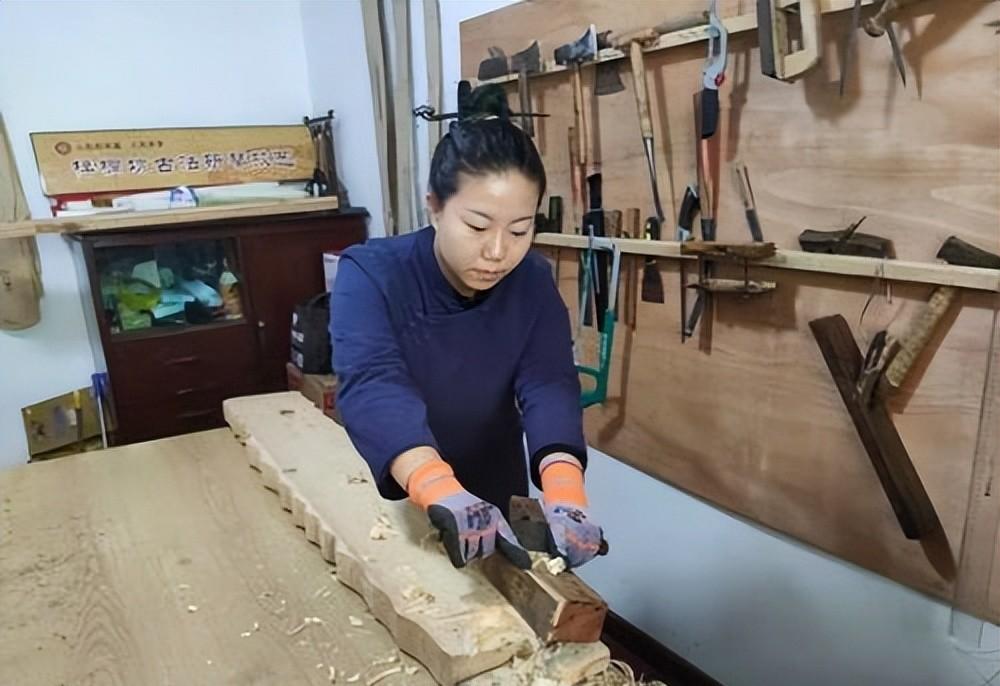Late spring explores the cracks, and the breeze gently blows the treetops. In the Weibin District of Baoji City, along the Xinhua Lane of Jinger Road into the small courtyard, the courtyard erected "Chen Cangzi Tong Guqin Fang". In a vermicelli room in the northwest corner, birds are singing outside the window, and the room is silent, only to hear the rustle of wood chips falling from the planks.

On the old desk, carving knives and slots of different shapes are placed among them. The small wooden box next to the desk emits a simple glow under the illumination of spring light.
"The harp is a fine craftsmanship technology, if you want to play the piano well, first of all, the material must be more than 300 years old fir, the edge, the groove belly, the push panel, the fixed line ..." The person in charge of the studio, Wang Wenqi, is explaining while doing it, only to see that she is skilled, the strength is uniform, and after a while the panel is pushed flat and smooth.
Compared with the paint, these procedures are relatively simple, Wang Wenqi took out the antler cream, eight treasure ash, purple sand and other paints, continued: "Lacquering is an indispensable link, we use the ancient method of painting, a total of 64 times, a time need to dry for three days, and each time will be allergic, the body will be very uncomfortable, follow-up also wrapped in hemp, sealing holes, auditions, tuning strings, accessories, etc., because of cumbersome, so it takes two years to make a bed before and after. ”
Wang Wenqi is now the youngest non-hereditary heir in Weibin District, born in 1997, although she is not very old, she has been specializing in harp craftsmanship for 11 years. At the age of 13, under the guidance of her family, she began to contact the guqin, and it was this accidental acquaintance that made her have a strong interest in playing the piano. Since the guqin is so beautiful to play, its production skills must also be very skilled, in order to continue to explore, the 14-year-old officially learned the art of harp cutting, and since then she has devoted herself to hard research.
"At the beginning, I was more curious, I liked it, and then I sometimes got hurt and allergic in the production process, after all, it was a girl, I loved beauty, so I had the idea of giving up, the hardships and obstacles in the middle, the bitter process only I knew, but it was good to stick to everything, and I would always stick to the road behind, strive for excellence, overcome difficulties, and pass on the skills of harp cutting." Wang Wenqi said.
In the past 11 years, in addition to studying and working, Wang Wenqi has given all other time to the art of harp, letting the traffic outside the wall be busy, and the pieces of old fir trees in front of her are her whole world, fortunately, her world is like the sunlight sprinkled outside the window, illuminating the edge of the wooden board.
In recent years, Wang Wenqi has deeply cultivated and specialized in harp cutting skills and achieved gratifying results. In April 2021, the harp technique was identified as an intangible cultural heritage project in Weibin District, and in November, Wang Wenqi was rated as a non-genetic inheritor of Weibin District, and is currently the first person to cut the violin skill in Baoji City. At the same time, with the care and support of the District Cultural Center, the Guqin Studio has been opened, and up to now, it has organized various guqin performances, exchange activities, training and counseling, and more than 100 times of harp inheritance, making new contributions to the development and inheritance of guqin culture.
(Correspondent Guo Fei)
Responsible Editor: Anxin Review: Yang Yong